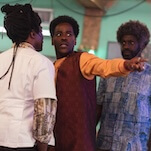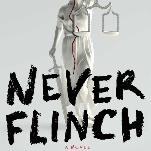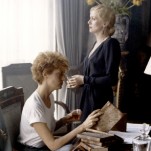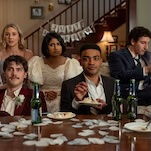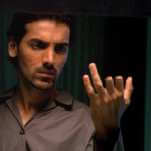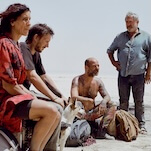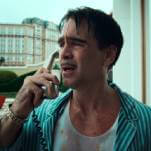The courtroom proceedings are fun and exciting, adorned with some humor from Ned’s quips (“So now we have to take the testimony of a cat”) but also packed with twists. Father Bain comes forward to speak ill of Claire, only to then confess he was wrong about her being an agent of the devil and telling the crowd about how she saved the Baxter boy. A quick smile from the father, however, reveals that he knew this change of tone would only further incriminate her in the minds of the townsfolk, who decide only a witch could turn a man of god away from the church. The trial gives new significance to past events, like Laoghaire’s love potion and the Thomas Baxter exorcism and the sick baby in the woods, weaving together a detailed courtroom thriller that follows the structure of a procedural but is backed up by serialized storytelling.
Caitriona Balfe and Lotte Verbeek heighten all of the drama with superb performances, with Verbeek turning in her best work yet. They give weight to the trial’s suspense, playing Claire and Geillis’s softer moments—like when the two joke about being actual witches with one another—as convincingly as the more emotionally fraught moments. The writers have very carefully built their friendship over the course of the season, making it feel organic and cogent.
There has always been a sense of a deep connection between Claire and Geillis. Part of it comes from their shared interest in healing as well as Geillis’s apparent disdain for the traditions of her time, especially when it comes to the way men treat women. But their relationship is richly defined beyond just common beliefs and interests. There’s an intimacy to their moments together in the woods, a closeness and comfort that mirrors Claire’s relationship with Jamie, minus the sex. That being said, even though there isn’t anything explicitly physical about their relationship, their interactions are often subtly erotic, even romantic. There’s the obvious example of last week’s little performance by Geillis for Claire under the full moon, but even tonight’s scenes hint at intimacy: “Lie near me,” Geillis says to Claire in the dark, cold pit where they await trial. Look, I’m not saying that the two are in love, but they definitely do love each other, in a way. The way their relationship has been written touches on the romance that imbues some close female friendships, and that gives context for a lot of Claire’s actions when it comes to Geillis. I saw some people in the comments last week expressing frustration that Claire would go against Jamie’s orders by going to warn Geillis. But I saw that as a very believable based on how we’ve seen these two grow close.
And now we know just how deep their connection extends. They share the the devil’s marks, which in actuality are scars from the smallpox vaccine. After weeks of hinting that she knows Claire’s hiding a secret, Geillis shares one of her own in the show’s biggest and most thrilling reveal to date: She’s from the future. In fact, she’s from even farther into the future than Claire: 1968. And based on her involvement in the Jacobite cause as well as her genuine look of despair when she finds out Claire arrived in the highlands on accident, Geillis very intentionally came to this time with some sort of mission in mind. We don’t get to learn much more though, as right after Geillis offers Claire the truth, she sacrifices herself by confessing to witchcraft in order to save Claire. There’s no way we’ve seen the end of Geillis. Even though the crowds were carrying her to the stake when we left her, she has to survive somehow, otherwise the reveal that she’s also a time traveler is pretty useless. My guess is that the very religious people of court aren’t down to let her unborn child burn, even if she claims he’s the son of the devil.
But even as we’re quickly torn away from Geillis, this reveal has immediate and significant repercussions for Outlander’s very premise. Suddenly, there are more time travelers in the mix. There’s the implication that time travel isn’t only random or accidental in this universe, as it was for Claire, which opens up so many new story possibilities. Keeping with the Good Wife comparison, “The Devil’s Mark” propels the story forward and explodes the narrative to create something new entirely in the same way a lot of the best episodes of The Good Wife—like “Hitting The Fan” and “Outside The Bubble”—do. “The Devil’s Mark” could have easily just been confined to the trial; that alone would have been enough to keep me on the edge of my seat. But the episode doesn’t just stop with the Geillis reveal; it piles on the drama by also letting Claire come completely clean to Jamie.
When it comes to romance on genre shows, it’s always only a matter of time before the Moment Of Truth—the moment the vampire tells the human they’re a vampire and shakes up their entire worldview, testing the strength of their love. Claire tells Jamie she’s from the future, and the final act of the episode thwarts conventions: Jamie doesn’t freak out or immediately call Claire insane. While that outcome would certainly be plausible, it’s much more interesting to have Jamie react the way he does. He supports Claire, acknowledges that he doesn’t necessarily understand it but that he trusts and believes her. The confession brings them closer but also creates a disconnect between them, as he realizes that to give Claire what she really wants, he has to let her return to her own home.
Just as the writers have carefully crafted the friendship between Claire and Geillis, so much detail and character work has been poured into making the Claire/Jamie relationship so believable. The writing, combined with Balfe and Sam Heughan’s chemistry, has made it easy to get on board with the two of them since the very first episode. So when Jamie takes her to Craigh na Dun so she can return home, it’s devastating, both actors effectively capturing a deep level of sadness that had me screaming at my screen for Claire to take him with her.
Instead, she decides to stay with him and go to Lallybroch. But make no mistake: Even though Claire chooses to remain where she is, the events in “The Devil’s Mark” have permanently changed Claire’s story, and because Outlander is intimately told through her eyes, that means the show’s narrative foundation has shifted. Claire’s still a sassenach adjusting to life in a new time and place, but Jamie has been pulled in on the secret, which changes their relationship and also lifts a lot of limitations off of Claire. Her actions moving forward will be different now that she has at least one person who she can be honest with (two if her path ever crosses again with Geillis). And that’s a lot more exciting than if she had just returned home to Frank.
Stray observations:
- Colum definitely had a hand in this trial, right? Sending Jamie with Dougal seems too convenient to be a coincidence. Again, book readers, try to keep any future reveals out of the comments or at least clearly mark them with spoiler warnings.
- I enjoyed how masterful Ned was with his manipulations of the court and the masses in attendance. He effectively discredited witnesses, but he also knew exactly the right things to say. In his takedown of the mother of the dead child, he appealed to her grief and also acknowledged the existence of fairies and changelings. Watching Ned work his courtroom magic
- Another thing I noticed in the comments last week was people defending the shoddy character development done around Laoghaire since the writers are just following the way the character is used in the book. But it’s my belief that adaptations not only can but should improve upon their source material. Sure, Laoghaire turns into a villain in the book because of a broken heart and jealousy, but there’s no reason the show has to follow that gendered cliché to a tee.
- Verbeek gives an awards-worthy performance in this episode, but I fear that most awards shows won’t take Outlander seriously because of its genre(s). That won’t stop me from campaigning for her on Twitter.
- Claire informing us that Geillis’s mark is a scar from the vaccination is one of the only times I can think of where the voiceover was actually useful. I wouldn’t have been able to put the pieces together in the moment without her help.





















